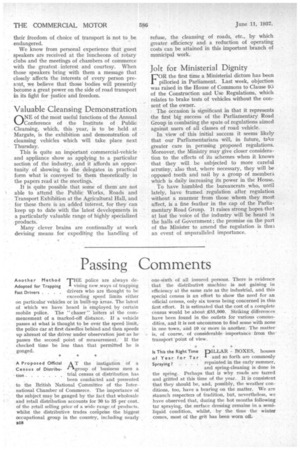Telling the World
Page 33

Page 34

If you've noticed an error in this article please click here to report it so we can fix it.
VOR long we have urged that road transport would not rise from the slough of despond until its difficulties and merits were made clear to the mass of traders, and the public awakened to the need for support for one of the country's largest industries. This fact has been given but tardy recognition ; there now arises a strong hope, however, that, through the efforts of the British Road Federation, our industry will benefit from a strong programme of propaganda.
As reported elsewhere in this issue. the B.R.F. has arranged for leading personalities in the industry to address rotary clubs, chambers of commerce, etc., in all parts of the country. This move will, we are convinced, make clear to the wide variety of traders the need for strong action if their freedom of choice of transport is not to be endangered.
We know from personal experience that guest speakers are received at the luncheons of rotary clubs and the meetings of chambers of commerce with the greatest interest and courtesy. When those speakers bring with them a message that closely affects the interests of every person present, we believe that those bodies will presently become a great power on the side of road transport in its fight for justice and freedom.
Valuable Cleansing Demonstration
ONE of the most useful functions of the Annual Conference of the Institute of Public Cleansing, which, this year, is to be held at Margate, is the exhibition and demonstration of cleansing vehicles which will take place next Thursday.
This is quite an important commercial-vehicle and appliance show as applying to a particular section of the industry, and it affords an opportunity of showing to the delegates in practical form what is conveyed to them theoretically in the papers read at the meetings.
It is quite possible that some of them are not able to attend the Public Works, Roads and Transport Exhibition at the Agricultural Hall, and for these there is an added interest, for they can keep up to date with the latest developments in a particularly valuable range of highly specialized • products.
Many clever brains are continually at work devising means for expediting the handling of refuse, the cleansing of roads, etc., by which greater efficiency and a reduction of operating costs can be attained in this important branch of municipal work.
Jolt for Ministerial Dignity
FOR the first time a Ministerial dictum has been pilloried in Parliament. Last week, objection was raised in the House of Commons to Clause 95 of the Construction and Use Regulations, which relates to brake tests of vehicles without the consent of the owner.
The occasion is significant in that it represents the first big success of the Parliamentary Road Group in combating the spate of regulations aimed against users of all classes of road vehicle.
In view of this initial success it seems likely that our Parliamentarians will, in future, take greater care in perusing proposed regulations. Moreover, the Ministry may give closer consideration to the effects of its schemes when it knows that they will be subjected to more careful scrutiny, also that, where necessary, they will be opposed tooth and nail by a group of members which is daily increasing its power in the House.
To have humbled the bureaucrats who, until lately, have framed regulation after regulation without a murmur from those whom they most affect, is a fine feather in the cap of the Parliamentary Road Group. It raises strong hopes that at last the voice of the industry will be heard in the halls of Government ; the promise on the part of the Minister to amend the regulation is thus an event of unparalleled importance.






























































































